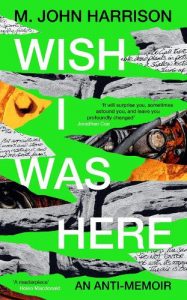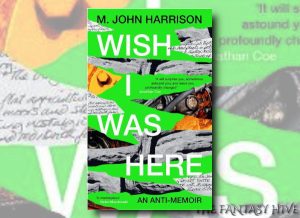WISH I WAS HERE by M. John Harrison (BOOK REVIEW)
“Massive amounts of what happens to you will happen via invisible and/or unparsable causal chains. Much of life, you will never know what happened to you at all, let alone to anyone else. Much of what goes on around you, you will never even notice. Though causes are everywhere present and dependable, the search for causality is to welter around looking for explanations you can’t have, using epistemologies and ontologies at best provisional. Why waste time, especially in fiction? Let’s have some representation in fiction for everyone who, without knowing it, puzzles through their lives in what used to be called ‘a dream’. Because that is all of us.”
 M. John Harrison is one of the most exciting and versatile of the writers to emerge from science fiction’s new wave. From his post-apocalyptic debut novel The Committed Men (1971) through his proto-New Weird Viriconium series (1971-85), literary works like Climbers (1989), his mind-bending space opera Kefahuchi Tract trilogy (2001-12) and post-Weird modern masterpiece The Sunken Land Begins To Rise Again (2020), Harrison has consistently pushed at the boundaries of what fiction can do, whilst breaking genre conventions wherever he comes across them and relentlessly following his own muse. As one of the key authors of his generation, his memoirs would be of interest to anyone with a passion for literature. Wish I Was Here (2023), subtitled An Anti-Memoir, with typical inspired Harrison perversity, both is and isn’t M. John Harrison’s memoirs. As with much of his work, the strictures of memoir as a genre create a series of expectations that Harrison can’t help but try to prize apart in his endless attempt to express the inexpressible. Wish I Was Here is many things – an attempt by Harrison to chase down the shadowy figure of himself as protagonist of his own autobiography, a reflection on the art of writing by one of our great writers, an interrogation of the extent to which we can ever find meaning within a text. Like Harrison’s writing as a whole, it is bold, deeply thought-provoking, beautifully written, and a challenge to any reader who expects easy answers. Wish I Was Here defies easy categorization, but easily stands up with Harrison’s dizzying best.
M. John Harrison is one of the most exciting and versatile of the writers to emerge from science fiction’s new wave. From his post-apocalyptic debut novel The Committed Men (1971) through his proto-New Weird Viriconium series (1971-85), literary works like Climbers (1989), his mind-bending space opera Kefahuchi Tract trilogy (2001-12) and post-Weird modern masterpiece The Sunken Land Begins To Rise Again (2020), Harrison has consistently pushed at the boundaries of what fiction can do, whilst breaking genre conventions wherever he comes across them and relentlessly following his own muse. As one of the key authors of his generation, his memoirs would be of interest to anyone with a passion for literature. Wish I Was Here (2023), subtitled An Anti-Memoir, with typical inspired Harrison perversity, both is and isn’t M. John Harrison’s memoirs. As with much of his work, the strictures of memoir as a genre create a series of expectations that Harrison can’t help but try to prize apart in his endless attempt to express the inexpressible. Wish I Was Here is many things – an attempt by Harrison to chase down the shadowy figure of himself as protagonist of his own autobiography, a reflection on the art of writing by one of our great writers, an interrogation of the extent to which we can ever find meaning within a text. Like Harrison’s writing as a whole, it is bold, deeply thought-provoking, beautifully written, and a challenge to any reader who expects easy answers. Wish I Was Here defies easy categorization, but easily stands up with Harrison’s dizzying best.
Wish I Was Here will thwart any reader hoping for a straight autobiographical account of M. John Harrison’s early life, the inspirations behind his great works, his thorny relationship with his contemporaries within and without genre – all the things one might traditionally expect from a memoir. Fascinating as that might be, this is not the story that Harrison is interested in telling. Instead, Wish I Was Here is built up of Harrison’s own notebooks, or “nowtbooks” as he wryly refers to them, the observations, reflections and considerations that he writes for himself when he’s working on a project, bricolaged and composted into a fragmented but thematically coherent whole. It’s a typically oblique strategy from Harrison, one that he acknowledges is just as doomed to failure in its attempt to capture or reify the “real” M. John Harrison as a straightforward account, but one that’s infinitely more interesting in how it gives genuine insight into Harrison’s mind as a creator, composer and composter of material.
Which is not to say that Harrison doesn’t reflect on his life within the pages of Wish I Was Here. Part of the process of trying to find some version of himself inevitably involves coming to terms with his own personal past, or at least acknowledging how it shaped his life. Harrison talks frankly about his parents, his upbringing, his passion for rock climbing, and getting older, as well as how each of these things has shaped his perspective as a writer. He also talks about the challenges of writing, particularly his struggles at finding his work hemmed in by genre conventions and how this spurred him on to kick against them and thwart expectations. Harrison’s constant wrestling with the limits of what language and writing can express is a key aspect of his ongoing search for himself. Many of his struggles with genre fiction emerge when his enthusiasm for science fiction, the fantastical and the Weird as a way of grappling with the inherent slipperiness of defining the human condition comes up against the strict requirements of the genre fiction market. Much of Harrison’s strength as a writer comes from his fearless engagement with ambiguities, the way his fiction and his non-fiction alike acknowledges the complexities and shades of the world we live in, the extents to which none of us can ever truly know what’s going on. This is what he does across genre, and it’s what he’s doing here in Wish I Was Here as well.
In amongst the personal and the existential, Harrison’s book is also full of generous and challenging advice to anyone who wants to write. Throughout Wish I Was Here, Harrison emphasizes the importance of acute observation and precision in one’s descriptions. Many of the book’s most powerful segments show Harrison’s own skill at this on full display – his descriptions of changes in the weather, of imagined conversations with aspects of himself, of his ageing cat, become imbued with a larger beauty and fraught with significance thanks to his careful construction and juxtaposition. He constantly warns the aspiring writer away from the clichéd, the trite, the obvious, instead encouraging an honest and deep engagement with one’s work. When I finished Wish I Was Here, I was not quite sure what I had read or how to describe it, but I was sure I had just witnessed one of the great writers at the peak of his powers, and that if his ongoing search for himself didn’t necessarily reveal the “real” M. John Harrison to me – if indeed such a thing was either possible or desirable – it did tell me more profound truths about my own relationship to reading and writing. Harrison’s daring “anti-memoir” is challenging, but rewards deep and open engagement.
Wish I Was Here is available now. You can order your copy on Bookshop.org

